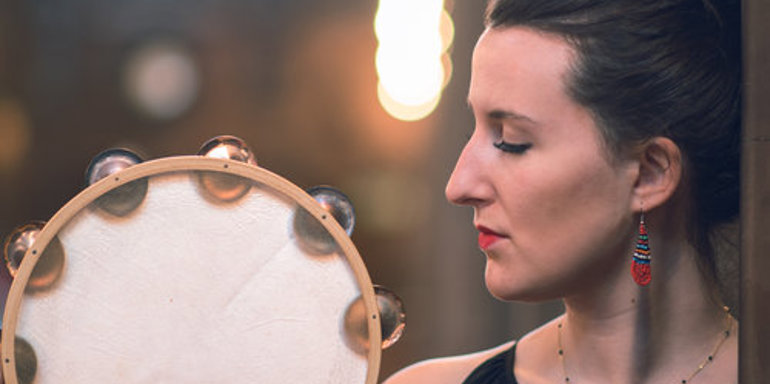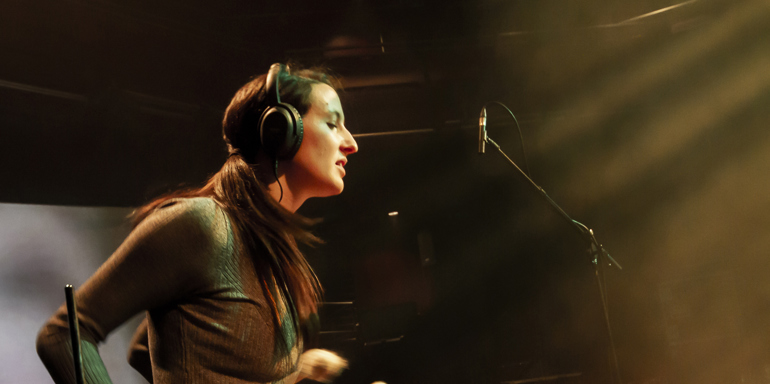
Delia Stevens
Delia Stevens’ versatility as a percussionist has allowed her to appear as a soloist, chamber, session and orchestral musician on platforms around the world.
She co-founded the Aurora Percussion Duo and the world music collective Kabantu, which have gone on to win prestigious awards and accolades. Delia has also worked regularly with notable ensembles, and collaborated with an eclectic mix of pop artists including Beth Orton, Catahl Mo Chroi, and Tim Burgess.
She has now joined the Classical faculty at Leeds Conservatoire, specialising in classical percussion and timpani.
What inspired you to get into percussion, and what made you pursue a career in this discipline?
The very first spark that caught me was watching the suspended cymbal player in my school orchestra; I went home that night and tried to draw a picture of it for my Mum – I was completely hooked.
Although it was a humble beginning, that lead me to audition for the National Children’s Orchestra of Great Britain (where I now tutor percussion), the National Youth Orchestra and the Junior Department of the Royal Northern College of Music (doing a 5-hour round commute and waking up at 5am every Saturday to travel up from Loughborough!). These incredible organisations offered me a portal into a world I had no idea existed. The truly inspiring teachers pioneering these projects were the first adults to ever treat me like a “professional” rather than a “child” which made me totally rise to the occasion. These worlds were among my favourite memories and best experiences growing up.
You perform with a number of different ensembles, which include chamber music and new music, can you tell us a bit about your different projects?
I co-founded the Aurora Percussion Duo and the world music collective Kabantu, both of which have won the coveted Royal Over-Seas League Competition and have given TED-Talks and broadcast on BBC Radio 3. Performance highlights include the BBC Proms, BBC Free Thinking Festival and Cambridge Folk Festival. The Aurora Percussion Duo have enjoyed multiple tours of China’s biggest concert halls having just returned from a 13-date tour this August and 2019 sees Kabantu collaborate with Manchester Camerata, Sinfonia Cymru, the BBC Singers and tour Switzerland.
I also enjoy the challenge of performing in contemporary classical ensembles including The London Sinfonietta, Almost Credible Music, Dark Inventions and House of Bedlam.
Collaborations with pop artists include indie-band Daughter, Rae Morris, Beth Orton, James, Gaz Coombes (Supergrass), Tim Burgess (The Charlatans), New Order and Cathal Mo Chroi (Chas Smash) from ‘Madness’.

How important is it to be flexible and adaptable as a musician – in terms of the style of music you play, the types of ensemble you perform with and the other musicians that you collaborate with?
Kabantu stems from the South African philosophy – “Ubuntu” – which translates as “I am who I am because of who we all are”. Live music is not created within a vacuum or as a sonic museum; via the relationship between its creators and audience, it mirrors the world around it and often expresses what cannot be conveyed purely verbally. I think particularly within a world that is embracing globalisation and getting ever smaller through technology, it is vital for musicians to venture beyond their “boxes” and embrace exchange to evolve and stay relevant to the time in which it is performed.
What have been some of your career highlights?
As a soloist I reached the televised Category Finals of BBC Young Musician of the Year, subsequently going on to win the RNCM Concerto and Gold Medal Competitions and making my Wigmore Hall debut. Since performing the work in the Krakow Last Night of the Proms in 2016, in 2019 I toured Avner Dorman’s incredible percussion concerto “Frozen in Time” across concert halls in Germany.
What are you looking forward to most about starting here at Leeds Conservatoire?
I am really excited about tapping into the potential that Leeds Conservatoire has for cross-genre collaboration and that blue sky thinking. Within the percussion department we can be very bespoke and cater to each individual’s interests. For example, this year, following conversations with students, I plan to invite some pro players from the West End to run masterclasses on tackling this side of the industry as a percussionist, with the opportunity to sit in on a professional show. I would also like to bring in a djembe master to show how students how it is actually done properly. There is opportunity for students to take part in the “side-by-side” scheme run by Opera North with Principal Percussionist Chris Bradley. My ethos is to work on the student’s current interests as well as broadening their horizons and exposing them to the incredible repertoire and scope a career as a percussionist offers.
What would be your key advice for musicians looking to pursue a career in music?
The questions Who? What? Why? How? Where? and When? are very useful. Try and work out what really makes you tick as a musician and who you are as a person and performer. If you are absolutely loving what you do and matching that with the technical discipline which supports a truly expressive performance, no matter the genre, the audience and promoters probably are probably loving it too.
Find out more about Delia Stevens in her Leeds Conservatoire Tutor Profile






